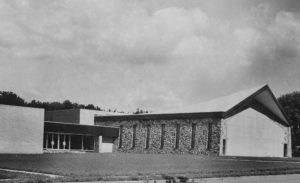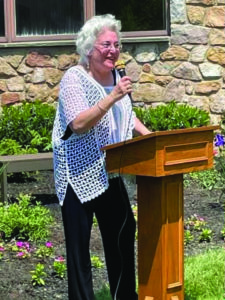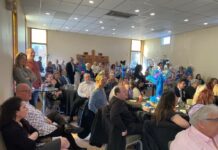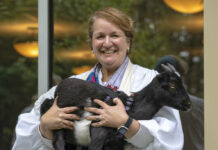
She was a rabbi on a “sabbatical of indeterminate length,” as she described it; and they were older synagogue members who had sold their building and considered disbanding.
But now, Rabbi Cynthia Kravitz’s “sabbatical” is over; and Congregation Hesed Shel Emet members are staying together and keeping their temple open. Kravitz, 69, is stepping up to lead the Pottstown shul and its 40 families on part-time pay.
The Lafayette Hill resident will help maintain a congregation that dates to 1892. Most of the 40 families are older and have been congregants for many years, according to Larry Cohen, the synagogue’s president. But, as Cohen put it, “There’s not a year that goes by that we don’t lose a couple members.”
“It’s mostly due to the fact that people are aging,” he added.
Kravitz began her tenure on Aug. 1. It is her sixth synagogue position in a career that started even before her ordination at the Reconstructionist Rabbinical College in 1983.
She served Society Hill Synagogue in Philadelphia while still a rabbinical student. Then she worked at the Germantown Jewish Centre, Congregation Or Ami in Lafayette Hill, Kesher Israel Congregation in West Chester and Temple Har Zion in Mount Holly, New Jersey. Kravitz spent 22 years at Kesher Israel from 1997-2019 before guiding Har Zion through the difficult pandemic days of 2020.
After that tiring year, the rabbi began her “sabbatical of indeterminate length” in January of 2021. Kravitz had spent four decades working to enhance Jewish education and leading congregations from the pulpit in the Philadelphia area. She was also part of the first generation of female rabbis in the United States following Sally Priesand’s ordination in 1972.
It was a career she was proud of and, with the pandemic still raging, a future she was uncertain about when she considered her next step.
Kravitz decided not to seek another congregational position. Friends and family members told her she was retired. But she never fully adopted the label.
“Cynthia Kravitz does not know the word retired,” the rabbi said. “I used the year to study.”

She read Hebrew poetry twice a week and took Zoom classes in Jewish thought and history through the Shalom Hartman Institute in Israel and the Herbert D. Katz Center for Advanced Judaic Studies at the University of Pennsylvania.
“It cemented what I already knew, but I could see it more clearly,” Kravitz said. “Every generation of Jewish people, we have our challenges. But it’s our spirit and our belief that has really carried us through.”
When Kravitz was meeting with Hesed Shel Emet members during her interview process, both in person and over Zoom, she felt like they were her partners. Both the rabbi and the congregants understood their challenge: Jews today are not affiliating with synagogues like they did “40 or 50 years ago,” Kravitz said.
“The biggest challenge is to help people see the value of being able to come together with others,” she added.
Based on that problem, the rabbi and the congregation share a vision for the future of the synagogue. Kravitz said they want to “build relationships between people,” and they want to build them on the belief that “Judaism is all of life.”
“My plan is to get people to interact with each other as much as possible. In person and on Zoom,” Kravitz said. “Then you let people take it from there.”
Cohen believes that Kravitz and the remaining members can make the vision come to life. There are a lot of Jews but not a lot of synagogues in western Montgomery County, he explained. The nearest synagogues are in Phoenixville, Blue Bell and Reading, all between 20 and 40 minutes away.
According to Cohen, a congregant since 2015 who also grew up there in the 1960s and ’70s, synagogue leaders need to do a better job of reaching out to people. They hired Kravitz because, as an experienced rabbi, she knows how to build a congregation and understands that, in a community with just 40 families, it’s her “number one mission,” as Cohen described it.
“She needs to reach out and talk to people,” he said. “Tell people we’re here and we’re available.”
Hesed Shel Emet sold its Keim Street building, which opened in 1962, to the Bethel Community Church in 2016. But congregants continue to worship in its lower sanctuary. After giving the church money for renovations, the synagogue will begin paying $1,600 a month in rent in a few years.
Cohen said the community will pay that “in perpetuity until we decide to end the contract.”






